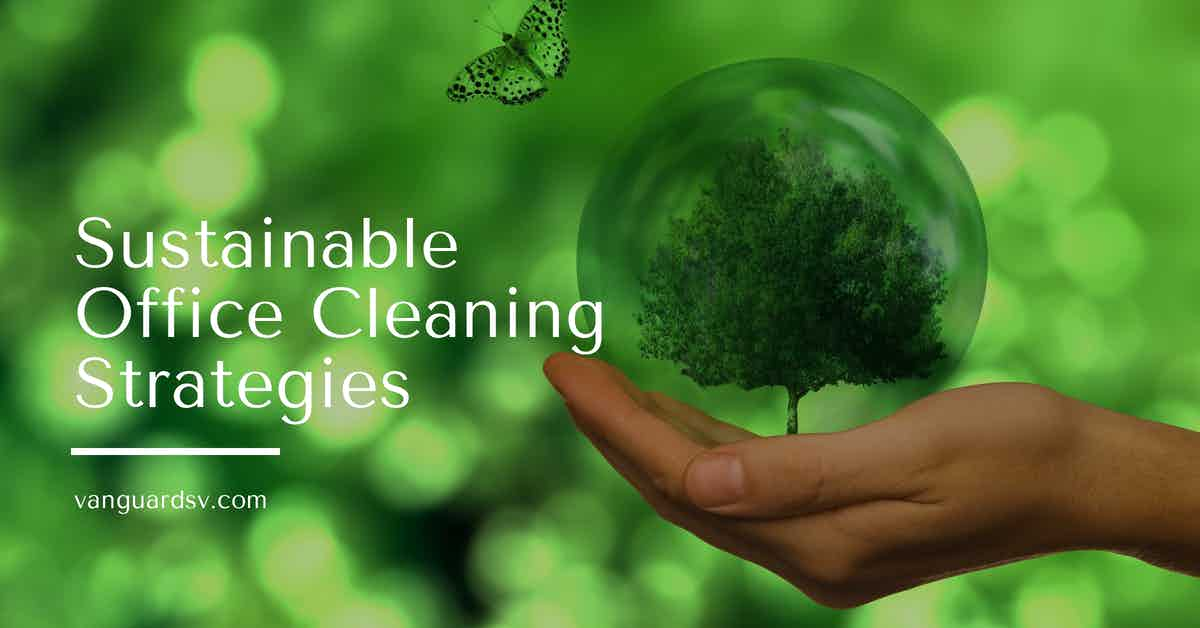Sustainable office cleaning strategies extend beyond natural resource management to include reductions in hazardous material use and waste, improvements to indoor environmental quality, and protections for occupant health and wellness.

Hygiene Theater: How COVID-19 Improved the Case for Sustainable Office Cleaning
At the onset of the SARS-CoV-2 pandemic, a significant volume of hazardous chemicals was dumped haphazardly onto every conceivable surface, including skin and food, in an attempt to protect individual health and prevent the spread of infection.
As the disease progressed, insights into its behavior and viability increased, and the dissemination of two critical pieces of knowledge was spread far and wide:
- The virus is enveloped, making it highly susceptible to inactivation with soap and water, and;
- The odds of becoming infected through dermal contact was approximately 1 in 1,000 or 0.01%.
Unfortunately, that data did not assuage fears nor halt the destructive and unnecessary application of hazardous materials--a phenomenon colloquially coined "hygiene theater."
Hygiene theater is a term used to describe the practice of taking hygiene measures to give off the feeling of improved safety without actually lowering risk of catching an illness—in this case, COVID-19.
It refers to all of the stadiums, grocery stores, businesses, and even people in individual homes that have been doing intense cleaning since the pandemic began, even though there's been little proven benefit from those sometimes extreme measures.
Moreover, while little measurable benefit was gained through dangerous sanitization methods, substantial damage was likely caused.
In the last year, cleaning in offices increased significantly to reduce the spread of COVID-19, resulting in never-before-seen levels of chemical consumption.
Most cleaning chemicals contain volatile organic compounds (VOCs) that compromise the safety and health of building occupants.
The VOCs are released into the air and negatively affect indoor air quality (IAQ).
Similarly, manufacturing and transporting these chemicals further harms the environment through using natural resources and the creation of greenhouse gas emissions.
Knowledge of the negative impacts of hygiene theater quickly spread to consumers and investors, who in turn placed pressure on governments, schools, and businesses to improve their methods and increase their efforts to protect facility occupants and the local environment or face public backlash.
A recent BCG survey of more than 3,000 people across eight countries has found that in the wake of the pandemic people are more concerned—not less—about addressing environmental challenges and are more committed to changing their own behavior to advance sustainability.
The heightened awareness is striking. Some 70% of survey participants said they were more aware now than before COVID-19 that human activity threatens the climate is and that degradation of the environment, in turn, threatens humans.
More than two-thirds of respondents think that economic recovery plans should make environmental issues a priority.
The crisis is driving change at the individual level, too, with 40% reporting that they intend to adopt more sustainable behavior in the future.
[...] 87% said companies should integrate environmental concerns into their products, services, and operations to a greater extent than they have in the past.
Sustainable Cleaning Methods
Several practical methods can be onboarded in support of in-demand sustainable cleaning methods, including:
- Replacing Chemicals - The US Environmental Protection Agency (EPA) maintains a Sustainable Marketplace of vendors, products, and services that meet its Ecolabel standard.
- Investing in Advanced Equipment - Salt-based electrochemically activated solutions produced via on-site generation systems are effective disinfectants against many pathogens and pathogenic bacteria. Several chemicals approved for use in electrostatic sanitization appliances have been registered with the EPA as effective against SARS-CoV-2. Robotic floor care equipment reduces water pollution by a reported 77%, air pollution by as much as 94%, and energy use by up to 97%. Chemical dilution systems have proven effective at reducing water and cleaning product use and waste. And, robotic vacuums have proven effective and prolonging the lifespan of carpeting and reducing landfill waste.
- Reduce, Reuse, and Recycle - Sustainable purchasing and consumption of post-consumer materials significantly reduce the burden human enterprise places on the planet.
References & Resources
- Science Brief: SARS-CoV-2 and Surface (Fomite) Transmission for Indoor Community Environments
- Cleaning and sanitizing Your Home
- Sustainability Matters Now More Than Ever for Consumer Companies
Takeaway
Actions taken to halt the spread of COVID-19 undermined public health and safety long after they were deemed unnecessary and dangerous, resulting in increased demands from consumers, workers, and investors to curb hygiene theater practices and improve sustainable cleaning and other business methods.
Core to this approach is a knowledgeable, experienced, and committed team of custodial service providers.
Outsourcing is a proven method for cost-effectively onboarding these highly in-demand skills and technologies at a fraction of the cost of managing the same service level in-house.
If you would like more information regarding the effectiveness of high-performance infection prevention and control measures, or if you would like to schedule a free, no-obligation on-site assessment of your facility's custodial needs, contact us today for a free quote!
In Bakersfield, CA, call (661) 437-3253
In Fresno, CA, call (559) 206-1059
In Valencia, CA, or Santa Clarita, CA, call (661) 437-3253
In Palmdale, CA or Lancaster, CA, call (661) 371-4756

